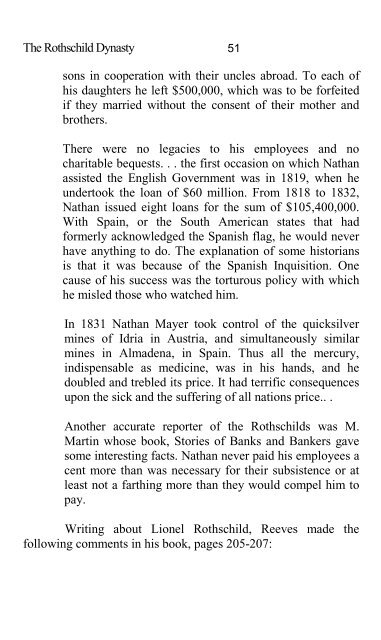coleman-the-rothschild-dynasty
coleman-the-rothschild-dynasty
coleman-the-rothschild-dynasty
You also want an ePaper? Increase the reach of your titles
YUMPU automatically turns print PDFs into web optimized ePapers that Google loves.
The Rothschild Dynasty 51<br />
sons in cooperation with <strong>the</strong>ir uncles abroad. To each of<br />
his daughters he left $500,000, which was to be forfeited<br />
if <strong>the</strong>y married without <strong>the</strong> consent of <strong>the</strong>ir mo<strong>the</strong>r and<br />
bro<strong>the</strong>rs.<br />
There were no legacies to his employees and no<br />
charitable bequests. . . <strong>the</strong> first occasion on which Nathan<br />
assisted <strong>the</strong> English Government was in 1819, when he<br />
undertook <strong>the</strong> loan of $60 million. From 1818 to 1832,<br />
Nathan issued eight loans for <strong>the</strong> sum of $105,400,000.<br />
With Spain, or <strong>the</strong> South American states that had<br />
formerly acknowledged <strong>the</strong> Spanish flag, he would never<br />
have anything to do. The explanation of some historians<br />
is that it was because of <strong>the</strong> Spanish Inquisition. One<br />
cause of his success was <strong>the</strong> torturous policy with which<br />
he misled those who watched him.<br />
In 1831 Nathan Mayer took control of <strong>the</strong> quicksilver<br />
mines of Idria in Austria, and simultaneously similar<br />
mines in Almadena, in Spain. Thus all <strong>the</strong> mercury,<br />
indispensable as medicine, was in his hands, and he<br />
doubled and trebled its price. It had terrific consequences<br />
upon <strong>the</strong> sick and <strong>the</strong> suffering of all nations price.. .<br />
Ano<strong>the</strong>r accurate reporter of <strong>the</strong> Rothschilds was M.<br />
Martin whose book, Stories of Banks and Bankers gave<br />
some interesting facts. Nathan never paid his employees a<br />
cent more than was necessary for <strong>the</strong>ir subsistence or at<br />
least not a farthing more than <strong>the</strong>y would compel him to<br />
pay.<br />
Writing about Lionel Rothschild, Reeves made <strong>the</strong><br />
following comments in his book, pages 205-207:


